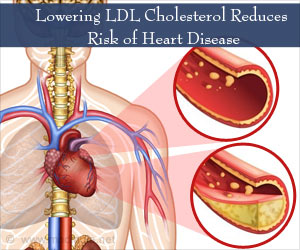New research study focuses on the use of statin therapy in people which tends to improve cardiology practices and patient outcomes.
Highlights
- Diabetes is a disease characterized by high blood glucose levels.
- A research team from Baylor College of Medicine, Houston studied that statins were not prescribed for diabetic patients even when it was found to lower heart attack and other heart diseases.
- The American Diabetes Association recommends the use of statins to supplement lifestyle changes in diabetic people.
- Statin use in diabetic patients should not only depend on LDL levels but must also focus on the risk of the cardiovascular disease.
TOP INSIGHT
Statins help in the treatment of cardiovascular diseases. Use of statins in diabetic people has decreased despite cardioprotective effects.
There is a high risk of developing heart-related diseases among diabetic people. Although number of studies show that statins can significantly help in treating heart-related disorders in diabetic patients, this study would be one of its kind to depict the use of statin therapy in patients and also helps to improve the performance and patient’s outcome.
Salim Virani, M.D., Ph.D., senior author of the study who is a Cardiologist at the Michael E.DeBakey VA Medical Center and Associate Professor at Baylor College of Medicine, Houston said that "Patients with diabetes, including those without established cardiovascular disease, have a very high risk of having a heart attack or stroke, and they are also more likely to die of one compared to people without diabetes"
"In this study, we found 38 percent of patients with diabetes were not on a statin, which can be lifesaving." he added.
There was a 57% practice level variation for statin use even while considering factors like age, gender, race, high blood pressure, high cholesterol, use of tobacco and insurance coverage of the patient. By comparing two similar patients, one is 57% more likely to be prescribed for statins on average when compared to another patient receiving care at another practice. This showed a 20% facility level variation in comparison to earlier analysis which can show a reflection of proper care and medication choices compared to individual cardiology practices.
"While some variation is OK, what we found is concerning and may ultimately affect clinical outcomes."
The American Diabetes Association also recommended that statins were used to supplement lifestyle changes for diabetic patients who are above 40 years of age despite baseline LDL levels or patients having heart diseases.
The data for practice level variations in statin therapy between May 2008 to October 2013 was collected from the American College of Cardiology's PINNACLE registry. It is a national cardiology outpatient quality improvement registry which provides data on coronary heart disease, atrial fibrillation, hypertension and heart failure.
This data was examined by a research team using statin therapy as the prescription at any time during the study period. About 215,193 patients from 204 cardiology practices were considered for the analysis. Patients receiving statins had a higher prevalence of risk factors for cardiac diseases and were more likely to receive non statin cholesterol lowering therapy with low LDL levels when compared to patients who did not take statins.
The results and practice level variations in patients with less than 100mg/dL levels ( level accepted by ATP III guideline ) were evaluated to assess the study results. The author also said that the difference in facility level variation and treatment with LDL level 100mg/dL when studied with main study results were not just linked with the guideline that was used to measure quality.
The findings of the guidelines for use of statins in diabetic patients suggest that patients and healthcare providers must talk on the prevention of heart attack and related death in the near future and patients must also report on any problems and adverse effects faced during the therapy to the healthcare provider.
The author also said that identifying barriers to statin use by testing electronic medical record alerts and support tools to improve the use of statins helps to reduce the risk of heart diseases.
Diabetes and Statins
Diabetes characterized by high blood glucose levels approximately affects 29.1 million people in the United States in 2014. According to the Center for Disease Control and Prevention about 1.4 million new cases are being diagnosed with diabetes every year.
Some of the common symptoms of diabetes include
- Excessive thirst
- Frequent urination
- Blurry vision and
- Fatigue.
Commonly Used Statin Drugs These drugs help in reducing the cholesterol levels. The standard care for the use of statins in diabetic patients were potrayed by the American Diabetic Association. Statin therapy in diabetic patients should not only depend on LDL levels but must also focus on the type of cardiovascular disease that is on the risk.
References
- Outpatient Registries - (http://cvquality.acc.org/NCDR-Home/Registries/Outpatient-Registries.aspx)
- American Diabetes Association Indications for Statins in Diabetes - (http://care.diabetesjournals.org/content/32/suppl_2/S384)
 MEDINDIA
MEDINDIA




 Email
Email










